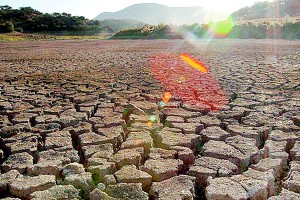Sunday Times 2
Climate change is ‘strongly linked’ to conflict and violence
Climate change is strongly linked to human conflict and violence worldwide, according to a new study.
Researchers found even relatively minor departures from normal temperature or rainfall substantially increased the risk of conflict in ancient times as well as today.
The results cover all major regions of the world and show similar patterns whether looking at data from Brazil, China, Germany, Somalia or the United States.

Even relatively minor departures from normal temperature or rainfall substantially increased the risk of conflict in ancient times as well as today (Reuters)
By amassing more data than any previous study, the researchers were able to show that the Earth’s climate plays a more influential role in human affairs than previously thought.
The study, published in the journal Science, found increased drought or higher than average annual temperature can trigger conflict.
Examples include spikes in domestic violence in India and Australia, increased assaults and murders in the United States and Tanzania, ethnic violence in Europe and South Asia, land invasions in Brazil, police using force in Holland, civil conflicts throughout the tropics, and even the collapse of Mayan and Chinese Empires.
The new study, by researchers at the University of California, Berkeley, and Princeton University in the U.S., could have critical implications for understanding the impact future climate change could have on human societies, as many global climate models project global temperature increases of at least 2C over the next half century.
Although there has been a virtual explosion in the number of scientific studies looking at how climatic impacts shape human conflict and violence, especially in in recent years, the research stems from disparate research fields ranging from climatology, archaeology and economics to political science and psychology.
The mystery of the highway in the sky: Sunbeams, clouds and strange shadows caused astronomical phenomenon in China
‘We collected 60 existing studies containing 45 different data sets and we re-analysed their data and findings using a common statistical framework. The results were striking.’
A central contribution of the new study was to develop a method for comparing results around the world, because the nature of climatic events differs across locations.
The new approach was to convert climate changes into location specific units known to statisticians as standard deviations.
Study co-author Marshall Burke, a doctoral candidate at Berkeley’s Department of Agricultural and Resource Economics, said: ‘We found that a one standard deviation shift towards hotter conditions causes the likelihood of personal violence to rise four per cent and intergroup conflict to rise 14 per cent.
‘For a sense of scale, this kind of temperature change is roughly equal to warming an African country by 0.4C. These are moderate changes, but they have a sizeable impact on societies.
‘We often think of modern society as largely independent of the environment, due to technological advances, but our findings challenge that notion.’
The researchers said that exactly why climate affects conflict and violence is the most pressing question for future related research.
Dr Hsiang said: ‘We’re in the same position that medical researchers were in during the 1930s – they could find clear statistical evidence that smoking tobacco was a proximate cause of lung cancer, but they couldn’t explain why until many years later.
‘In the same way, we can show that climatic events cause conflict, but we can’t yet exactly say why.’
© Daily Mail, London
Follow @timesonlinelk
comments powered by Disqus

